by [email protected] | Jul 13, 2022 | Prescriptions for your Practice
Podcast: Play in new window | Download
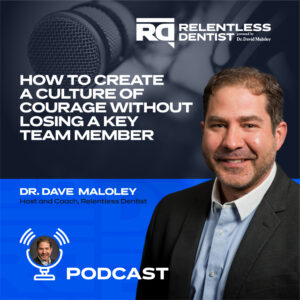 “A life spent making mistakes is not only more honorable, but more useful than a life spent doing nothing.” — George Bernard Shaw
“A life spent making mistakes is not only more honorable, but more useful than a life spent doing nothing.” — George Bernard Shaw
The problem we’re addressing today is that cultures that are too careful, that are too risk-averse, unintentionally undermine innovation, undermine practice growth, and really undermine employee job satisfaction.
In this episode, I discuss high-performance dental teams. So, if you want to:
- Increase your team’s productivity,
- Avoid losing a key team member, and
- Encourage mistakes of ambition so you can be an effective boss, then tune in now!
Lastly, I have an offer for you! I’m looking for four hungry dentists who want to join my case study group. If you’re a little frustrated with your current situation or more than a little frustrated, you’re a perfect candidate. Listen to this episode and find out how to join.
Listen in and find solutions to common practice issues at Prescriptions for Your Practice.
If you enjoyed this episode, please share it with your dentist friends. Check my Instagram (@dr.maloley) and TikTok (@dr.maloley) for your daily dose of thought-provoking content so that you can be a better practice owner. Don’t forget to subscribe to the show on iTunes to get automatic episode updates for The Relentless Dentist! And, finally, please take a minute to leave us an honest review and rating on iTunes. They really help us out when it comes to the show’s ranking, and I make it a point to read every single one of the reviews we get.
Key Quotes:
- “Unfortunately, our industry is notorious for hiring bright, ambitious people. We work really hard to find the right people. And then we put them in situations where they squander those talents and the ambition goes to waste.”
- “The possibility is that we can get the most out of our payroll dollars and have a constant supply of fresh ideas and innovation in our practice, which is gonna move our practice into the future.”
- “Let’s learn some lessons from one mistake and turn that into something that we all can learn from.”
- “Either we win or we learn.”
- “Sometimes the most powerful words that a leader can state is ‘this is what I’m working on.’ Or ‘this is where I messed up. And this is what I plan to do to resolve it.’ Or ‘this is my mistake and this is what I learned.'”
Featured on the Show:


by [email protected] | Jun 8, 2022 | Prescriptions for your Practice
Podcast: Play in new window | Download
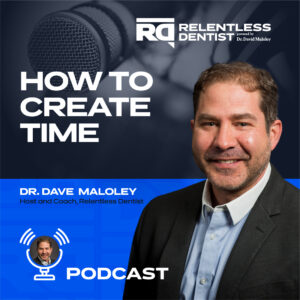 Are you tired because you have been exhausted? Do you have a team waiting to support you, but they don’t have information? Are you living in a world of “mushroom communication”?
Are you tired because you have been exhausted? Do you have a team waiting to support you, but they don’t have information? Are you living in a world of “mushroom communication”?
The issue with all entrepreneurs is there are not enough hours in the day. You only have so much workforce, and sometimes that gets in the way because we end up doing too much. We create this kind of codependent relationship with our employees because we’re doing what they should be doing on their own, but we have to take responsibility for that.
In this episode, I discuss how to avoid practice owner overwhelm. So if you want to focus ONLY on your clinical and CEO responsibilities, get good at delegation, and create a self-motivated team so you can enjoy your workdays, tune in now!
Listen in and find solutions to common practice issues at Prescriptions for Your Practice.
If you enjoyed this episode, please share it with your dentist friends. Don’t forget to subscribe to the show on iTunes to get automatic episode updates for The Relentless Dentist! And, finally, please take a minute to leave us an honest review and rating on iTunes. They really help us out when it comes to the show’s ranking, and I make it a point to read every single one of the reviews we get.
Key Quotes:
- “The possibility becomes that we can create mental freedom and a great team through delegation. Delegation is this result multiplier. It’s a force multiplier.”
- “We’re looking for results. We’re looking to add more value to more patients each day. That’s how we get a business to grow.”
- “We have to appreciate that delegation takes time. That’s why we don’t do it because it takes time.”
- “It’s the autonomy that will really drive the results for the total business.”
- “You can’t just start with delegation. You can’t just start with a self-managing team. There needs to be a process.”
- “CEO stuff is thinking, and you need time set aside for them, and you can’t do that if you don’t have it.”
Featured on the Show:


by [email protected] | Apr 6, 2022 | Prescriptions for your Practice
Podcast: Play in new window | Download
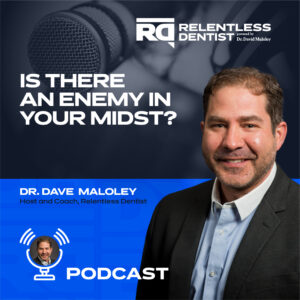 Most dentists struggle to find and retain solid employees — someone hungry, humble, and smart. This often leads to the temptation to settle for underperformers and allow culture-cancers to impact the team negatively. But the possibility is that you can have a deliberate process that helps team members understand that part of their job is always getting better at their job, constantly growing, and continuously improving.
Most dentists struggle to find and retain solid employees — someone hungry, humble, and smart. This often leads to the temptation to settle for underperformers and allow culture-cancers to impact the team negatively. But the possibility is that you can have a deliberate process that helps team members understand that part of their job is always getting better at their job, constantly growing, and continuously improving.
This week’s theme is enhancing culture. In this episode, I discuss keeping underperforming employees from undermining your culture. So if you want to:
- have a deliberate process that helps team members understand that part of their job is always to be getting better at their job;
- know when to clarify, connect, coach, correct, and collide; and
- understand what makes an employee a subtractor and what makes one a divider so that you can enhance your culture …
you need to tune in now!
Tune in and find solutions to common practice issues at Prescriptions for Your Practice.
Key Quotes:
- “Our job as owners is to make sure that everyone, a hundred percent of the team, is either onboard or we have to get them out of the way.”
- “Let’s make sure that we’re moving further, faster in the direction that you really desire for your practice.”
- “You as the owner really need to double down your focus and not only be a role model of that focus but also become great at refocusing the team.”
- “Praise and constructive criticism only work well in the presence of clear expectations.”
- “Don’t assume that there is clarity. Verify, verify, verify.”
- “It’s important that everyone on the team check their ego at the door and understand that once they clock in, their job is to take care of one another and the patients.”
- “In times of uncertainty, communication should be more abundant.”
- “All of your team members should feel like you’re betting on their success all of the time that they’re working for you. And then make sure they believe that they can pull this off.”
Featured on the Show:


by [email protected] | Feb 9, 2022 | Prescriptions for your Practice
Podcast: Play in new window | Download
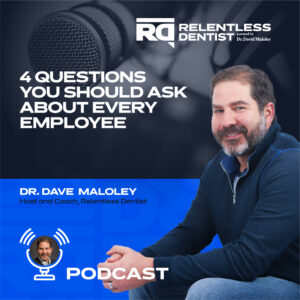 Fact: In today’s polarized and litigious society, it’s easier to complain than find good employees. Crafting a reliable team to work with is almost next to impossible. But there’s still hope.
Fact: In today’s polarized and litigious society, it’s easier to complain than find good employees. Crafting a reliable team to work with is almost next to impossible. But there’s still hope.
How do you build a practice with a culture that gives patients an experience in a high trust environment? That gives employees a workplace that provides them both money and meaning? And that ensures the vitality of your business? If you’re asking yourself these questions, you have to listen in.
This week’s podcast topic is about enhancing culture — I’ll be discussing four questions you should ask yourself about every single employee. I’ll cover the most valuable skill a dental practice owner can develop far more valuable than any procedure you can learn or add to your procedure mix. So, if you want a framework that unleashes the genius of your team, a way to diagnose the dysfunctions in your culture, and a method to avoid all that counterproductive advice that inhibits team immunity and holds your practice back, then stay tuned.
Tune in and find solutions to common practice issues at Prescriptions for Your Practice.
Key Quotes:
- “I’m proposing is that we become great at diagnosing the true problem and master the art of building and aligning a team.”
- “Team building is the most valuable skill to acquire in our profession right now.”
- “One of the keys to strong leadership is you teach people how to think. You teach them how you would make decisions, and therefore they can make decisions.”
- “If we start to engage these things, you’ll see people get a little bit better and a little bit more confident, a little bit more decisive, a little bit more service-oriented, and surprise and delight patients a little bit more.”
- “And a lot of people say, I can’t get my team to think like an owner, and that’s a partial truth. They’ll never be as invested as you are.”
Featured on the Show:


by [email protected] | Jan 12, 2022 | Prescriptions for your Practice
Podcast: Play in new window | Download
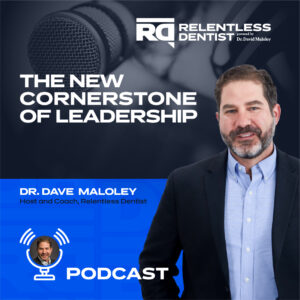 What do you think is one of the essential ingredients in a healthy and high-performing team?
What do you think is one of the essential ingredients in a healthy and high-performing team?
According to research, 90% of people are daydreaming and visioning about the future when forced to do nothing. And a separate study shows that there’s a key element that makes 14% of people more productive across different industries. Listen in to discover this critical productivity booster.
In this episode, I’ll talk about enhancing your culture. If you want to understand what will make you and your employees 14% more productive, if you want to provide the four things that every follower needs from their leader, if you want to utilize three levels of thinking to improve team engagement and unity, and if you want to find out this new cornerstone to effective leadership, then this podcast is for you.
Tune in and find solutions to common practice issues at Prescriptions for Your Practice.
Key Quotes:
- “Attracting and retaining a high-performance team is getting harder and harder, but within every problem is a possibility.”
- “By understanding and embracing the key ingredients of a happy workplace and a productive culture, your practice can become that talent magnet and beat the local competition.”
- “One thing I don’t like about S.M.A.R.T. goals is that they’re reasonable. If there’s not a little bit of intimidation, then the goals don’t wake up the genius on your team.”
- “Followers need four things from their leaders. One is stability. Two is trust. Three is compassion, and four is hope.”
- “We’re mentally agile. We’re emotionally agile. We’re organizationally agile to make sure that we’re always doing whatever it takes to make sure that the future of the organization, the future of the team, the future of the owner, the future of the patient experience is better than it is right now.”
Featured on the Show:


 “A life spent making mistakes is not only more honorable, but more useful than a life spent doing nothing.” — George Bernard Shaw
“A life spent making mistakes is not only more honorable, but more useful than a life spent doing nothing.” — George Bernard Shaw


 Are you tired because you have been exhausted? Do you have a team waiting to support you, but they don’t have information? Are you living in a world of “mushroom communication”?
Are you tired because you have been exhausted? Do you have a team waiting to support you, but they don’t have information? Are you living in a world of “mushroom communication”?

 What do you think is one of the essential ingredients in a healthy and high-performing team?
What do you think is one of the essential ingredients in a healthy and high-performing team?